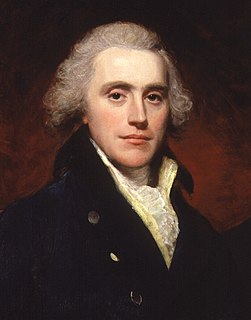See also
| This disambiguation page lists articles associated with the title Major ministry. If an internal link led you here, you may wish to change the link to point directly to the intended article. |
Major ministry may refer to:
| This disambiguation page lists articles associated with the title Major ministry. If an internal link led you here, you may wish to change the link to point directly to the intended article. |

The Province of Canada was a British colony in North America from 1841 to 1867. Its formation reflected recommendations made by John Lambton, 1st Earl of Durham, in the Report on the Affairs of British North America following the Rebellions of 1837–1838.

The United Kingdom is a unitary state with devolution that is governed within the framework of a parliamentary democracy under a constitutional monarchy in which the monarch, currently Queen Elizabeth II, is the head of state while the Prime Minister of the United Kingdom, currently Boris Johnson, is the head of government. Executive power is exercised by the British government, on behalf of and by the consent of the monarch, and the devolved governments of Scotland, Wales and Northern Ireland. Legislative power is vested in the two chambers of the Parliament of the United Kingdom, the House of Commons and the House of Lords, as well as in the Scottish and Welsh parliaments and the Northern Ireland Assembly. The judiciary is independent of the executive and the legislature. The highest court is the Supreme Court of the United Kingdom.

The 1997 United Kingdom general election was held on 1 May 1997. The incumbent governing Conservative Party led by Prime Minister John Major was defeated in a landslide by the Labour Party led by Tony Blair.

The 1992 United Kingdom general election was held on Thursday 9 April 1992, to elect 651 members to the House of Commons of the United Kingdom. The election resulted in the fourth consecutive victory for the Conservative Party since 1979 and would be the last time that the Conservatives would win an overall majority at a general election until 2015. This election result took many by surprise, as opinion polling leading up to the election day had shown the Labour Party, under leader Neil Kinnock, consistently, if narrowly, ahead.

Black Wednesday occurred on 16 September 1992 when the British government was forced to withdraw the pound sterling from the European Exchange Rate Mechanism (ERM), after a failed attempt to keep the pound above the lower currency exchange limit mandated by the ERM. At that time, the United Kingdom held the Presidency of the European Communities.
A national unity government, government of national unity (GNU), or national union government is a broad coalition government consisting of all parties in the legislature, usually formed during a time of war or other national emergency.

The 1964 United Kingdom general election was held on 15 October 1964, five years after the previous election, and thirteen years after the Conservative Party, first led by Winston Churchill, had entered power. It resulted in the Conservatives, led by its fourth leader, Sir Alec Douglas-Home, narrowly losing the election to the Labour Party, led by Harold Wilson, with Labour having an overall majority of four seats. It resulted in Labour ending its thirteen years in opposition and led Wilson to become, at the time, the youngest Prime Minister since Lord Rosebery in 1894. In spite of all this, Labour polled fewer votes than they had in 1959 under Hugh Gaitskell.

In the first Parliament to be held after the Union of Great Britain and Ireland on 1 January 1801, the first House of Commons of the United Kingdom was composed of all 558 members of the former Parliament of Great Britain and 100 of the members of the House of Commons of Ireland.
The Goss Ministry was a Ministry of the Government of Queensland, led by Labor Premier Wayne Goss. It commenced on 7 December 1989, five days after the Cooper Ministry, led by Premier Russell Cooper of the National Party, was defeated at the 1989 election. The Goss Ministry was followed by the Borbidge Ministry on 19 February 1996 following the loss by Labor of the Mundingburra by-election two weeks earlier, which deprived the Government of its majority.

The Grafton ministry was the British government headed by Augustus FitzRoy, 3rd Duke of Grafton. It served between October 1768 and January 1770.

The Keating Government was the federal executive government of Australia led by Prime Minister Paul Keating of the Australian Labor Party from 1991 to 1996. The Government followed on from the Hawke Government after Paul Keating replaced Bob Hawke as Labor leader in an internal party leadership challenge in 1991. Together, these two governments are often collectively described as the Hawke-Keating Government. The Keating Government was defeated in the 1996 federal election and was succeeded by the Howard Coalition government.
Wilson ministry may refer to:
Thatcher ministry may refer to:
The Greiner–Murray ministry (1991–92) or Second Greiner–Murray ministry or Second Greiner ministry was the 81st ministry of the New South Wales Government, and was led by the 37th Premier of New South Wales, the Honourable Nick Greiner,, representing the Liberal Party in coalition with the National Party, led by the Honourable Wal Murray,.
Cameron ministry may refer to:

The Australian Labor Party , commonly known as South Australian Labor, is the South Australian Branch of the Australian Labor Party, originally formed in 1891 as the United Labor Party of South Australia. It is one of two major parties in the bicameral Parliament of South Australia, the other being the Liberal Party of Australia.

John Major formed the first Major ministry upon the resignation of Margaret Thatcher in November 1990, after being invited by Queen Elizabeth II to lead the next government. Major inherited a majority government.

John Major formed the second Major ministry following the 1992 general election after being invited by Queen Elizabeth II to begin a new government. His government fell into minority status on 13 December 1996.
Blair ministry may refer to: